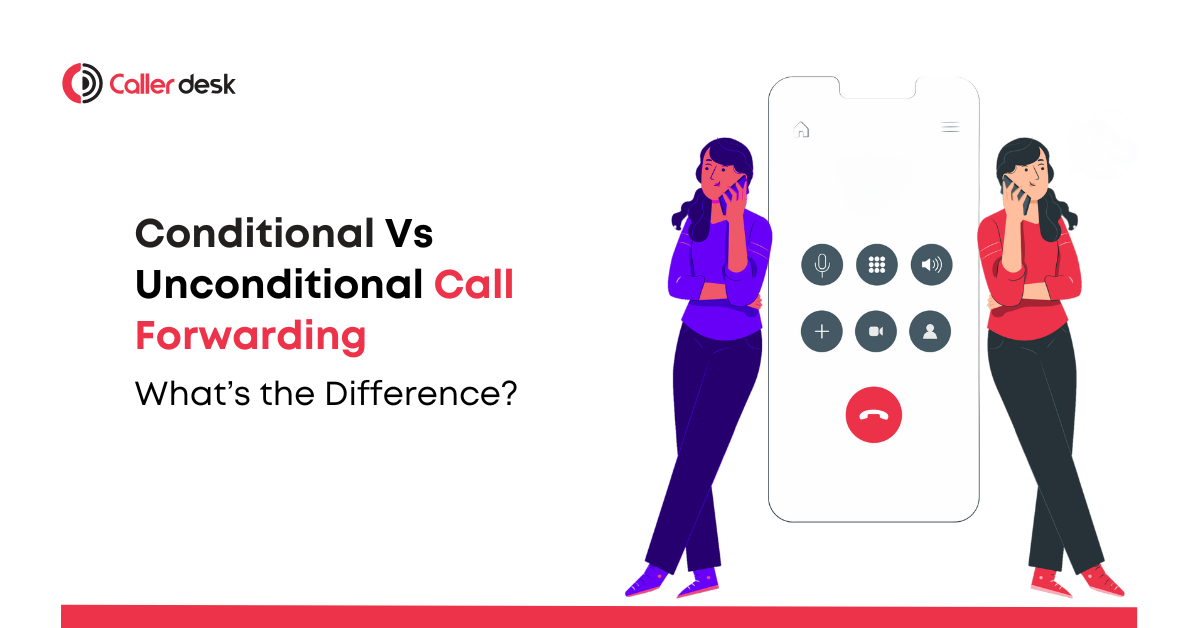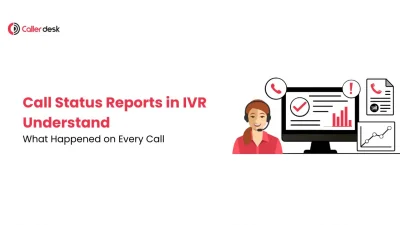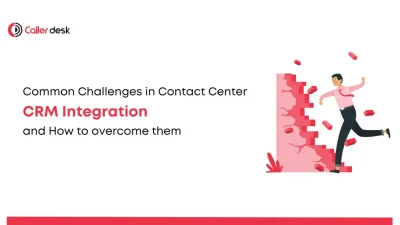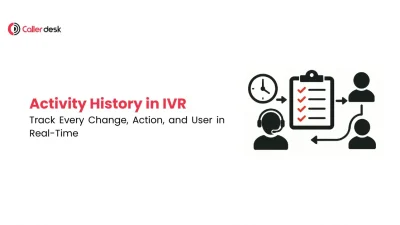Effective communication is the backbone of any successful business. Missing an important call can mean losing a potential customer, an important business opportunity, or even damaging your brand’s reputation. This is why call forwarding has become an essential feature for businesses and individuals alike.
- 1 What Is Call Forwarding?
- 2 What Is Conditional Call Forwarding?
- 3 What Is Unconditional Call Forwarding?
- 4 Key Differences Between Conditional and Unconditional Call Forwarding
- 5 When to Use Conditional or Unconditional Call Forwarding?
- 6 Why Choose CallerDesk for Call Forwarding Solutions?
- 7 Conclusion
Call forwarding allows incoming calls to be automatically redirected to another number, ensuring uninterrupted communication no matter where you are. However, not all call forwarding solutions are created equal. The two main types—conditional call forwarding and unconditional call forwarding—offer distinct features designed to meet specific needs.
In this comprehensive guide, we’ll explore the differences between these two options, their benefits, and how to choose the one that best suits your personal or business communication needs.
What Is Call Forwarding?
Call forwarding is a telecommunications feature that enables calls to be rerouted from one phone number to another. Whether you’re unavailable, busy, or outside your network coverage, call forwarding ensures that no important call goes unanswered.
Core Benefits of Call Forwarding:
- Improved Connectivity: Stay reachable regardless of your location or phone status.
- Enhanced Customer Satisfaction: Ensure customers always have someone to talk to, even during peak times or emergencies.
- Flexibility: Redirect calls to mobile phones, landlines, or even international numbers as needed.
- Efficient Call Management: Optimize call handling for both personal and professional needs.
What Is Conditional Call Forwarding?
Conditional call forwarding is designed to forward calls only under specific circumstances. This feature activates based on pre-set conditions, making it a great choice for individuals and businesses that want to manage call forwarding more selectively.
When Does Conditional Call Forwarding Activate?
- Busy Line Forwarding: Calls are redirected when your primary line is engaged.
- Unanswered Call Forwarding: Calls are forwarded after a specific number of rings.
- Out-of-Coverage Forwarding: Calls are routed when your phone is switched off or unreachable.
- After-Hours Forwarding: Redirects calls during non-business hours to voicemail or an alternate number.
Advantages of Conditional Call Forwarding:
- Selective Control: Forward calls only when it’s truly necessary.
- Improved Work-Life Balance: Maintain availability while minimizing disruptions during personal time.
- Reduced Missed Calls: Prevent missed opportunities by automatically redirecting calls under specific conditions.
What Is Unconditional Call Forwarding?
Unconditional call forwarding ensures that all incoming calls are automatically forwarded to another number, regardless of your phone’s status. This option is ideal for businesses and individuals who prefer consistent connectivity without manual intervention.
Key Features of Unconditional Call Forwarding:
- Always-On Redirection: Every incoming call is forwarded to a pre-set number.
- Seamless Remote Work: Perfect for professionals who work from home or on the go.
- Downtime Management: Prevents communication gaps during network outages or technical issues.
- Effortless Setup: Requires minimal configuration, making it ideal for users who want simplicity.
Advantages of Unconditional Call Forwarding:
- Constant Availability: Ensure no call is missed, regardless of your availability.
- Convenience: Set it up once and let it handle all incoming calls automatically.
- Reliability: Provides a dependable communication channel during emergencies or travel.
Key Differences Between Conditional and Unconditional Call Forwarding
| Feature | Conditional Call Forwarding | Unconditional Call Forwarding |
| Activation Trigger | Based on specific conditions (e.g., busy, unanswered, unreachable). | Activates for all incoming calls, regardless of conditions. |
| Flexibility | High: Customizable for various scenarios. | Low: Automatically forwards all calls. |
| Use Case | Ideal for selective call management during certain times. | Best for consistent unavailability or full call redirection. |
| Setup Complexity | Moderate: Requires defining conditions for activation. | Simple: One-time setup for all-call redirection. |
| Target Users | Professionals managing a mix of availability and downtime. | Individuals or businesses needing uninterrupted call forwarding. |
When to Use Conditional or Unconditional Call Forwarding?
Conditional Call Forwarding:
This is ideal for professionals and businesses that need to redirect calls selectively:
- During Meetings: Prevent interruptions while ensuring important calls are redirected.
- While Traveling: Forward calls when out of network coverage or during international travel.
- After Business Hours: Redirect calls to voicemail or a dedicated on-call employee.
Unconditional Call Forwarding:
This is perfect for those who want a seamless communication setup without manual intervention:
- Remote Work: Ensure all business calls are redirected to your home office or mobile device.
- Planned Downtime: Forward calls to another team member or department during scheduled breaks.
- 24/7 Availability: Businesses offering round-the-clock customer support can use this feature to ensure uninterrupted service.
Why Choose CallerDesk for Call Forwarding Solutions?
1. Advanced Features for Every Need
- Conditional and Unconditional Forwarding: Tailor your call forwarding strategy with ease.
- Real-Time Analytics: Monitor call patterns, peak hours, and customer behavior to optimize service.
- Integrated IVR: Seamlessly guide callers to the right department or team member.
2. Simplified Setup and Management
- User-Friendly Interface: Configure call forwarding settings in minutes.
- Customizable Options: Adjust forwarding rules based on your business’s unique requirements.
3. Competitive Edge
- CallerDesk clients report a 45% improvement in customer satisfaction and a 30% increase in resolved inquiries.
- Advanced features like CRM integration and call recording enhance productivity and customer service.
4. Unmatched Customer Support
- 24/7 support ensures your call forwarding system runs smoothly at all times.
Conclusion
The choice between conditional and unconditional call forwarding ultimately depends on your specific needs and communication preferences. Conditional call forwarding offers flexibility and control, making it a great choice for professionals and businesses that need to manage calls selectively. On the other hand, unconditional call forwarding ensures constant availability, making it ideal for remote work, downtime management, and uninterrupted customer service.
With CallerDesk, you can access cutting-edge call forwarding solutions that cater to both conditional and unconditional needs. From advanced analytics to seamless CRM integrations, CallerDesk empowers businesses to enhance their communication strategies, improve customer satisfaction, and support growth.
Ready to transform your communication? Get started with CallerDesk today and experience the difference of optimized call forwarding. Book a Free Demo!





